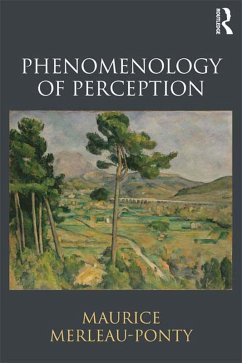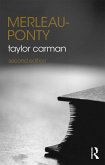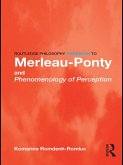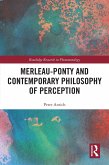Dieser Download kann aus rechtlichen Gründen nur mit Rechnungsadresse in A, B, BG, CY, CZ, D, DK, EW, E, FIN, F, GR, HR, H, IRL, I, LT, L, LR, M, NL, PL, P, R, S, SLO, SK ausgeliefert werden.
"This new translation, which is accurate, sensitive and eloquent, will, I hope, enable the reader to better deal with the inaccuracy, opacity and rigidity which are part of any perception and of any text." - Eran Dorfman, Notre Dame Philosophical Reviews
"This is an extraordinary accomplishment that will doubtless produce new readers for the remarkable philosophy of Merleau-Ponty. This excellent translation opens up a new set of understandings of what Merleau-Ponty meant in his descriptions of the body, psychology, and the field of perception, and in this way promises to alter the horizon of Merleau-Ponty studies in the English language. The extensive index, the thoughtful annotation, and the guidance given about key problems of translation not only show us the richness of Merleau-Ponty's language, but track the emergence of a new philosophical vocabulary. This translation gives us the text anew and will doubtless spur thoughtful new readings in English." - Judith Butler, University of California - Berkeley, USA
"This lucid and compelling new translation not only brings one of the great breakthrough books in phenomenology back to life - it gives to it an entirely new life. Readers will here find original insights on perception and the lived body that will change forever their understanding of themselves and the world they inhabit." - Edward S. Casey, Stony Brook University, USA
"This book is not to be read as a contribution to a school of philosophy (called Phenomenology), but as one of the classical works of philosophy in the Western tradition, essential reading for any school. I love it partly for the incredibly rich diet of examples, both personal and scientific, described in such a way as to make you rethink every aspect of human life and experience. The new translation and its appendices enrich the understanding - and enjoyment - of today's reader." - Ian Hacking, Collège de France, France
"Landes' excellent translation preserves the fluidity and subtlety of Merleau-Ponty's philosophical prose. Phenomenology of Perception is finally available in an English-language edition fully adequate for the purposes of scholarship, and which allows the reader to appreciate with accuracy the distinctive patterns and movements of Merleau-Ponty's thought." - Sebastian Gardner, University College London, UK
"It is impossible to define an object in cutting it off from the subject through which and for which it is an object; and the subject reveals itself only through the objects in which it is engaged. Such an affirmation only makes the content of naive experience explicit, but it is rich in consequences. Only in taking it as a basis will one succeed in building an ethics to which man can totally and sincerely adhere. It is therefore of extreme importance to establish it solidly and to give back to man this childish audacity that years of verbal submission have taken away: the audacity to say: "I am here." This is why The Phenomenology of Perception by Maurice Merleau-Ponty is not only a remarkable specialist work but a book that is of interest to the whole of man and to every man; the human condition is at stake in this book." - Simone de Beauvoir, 1945









